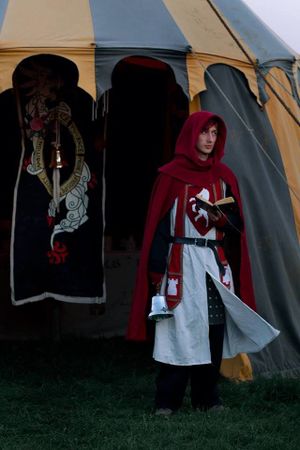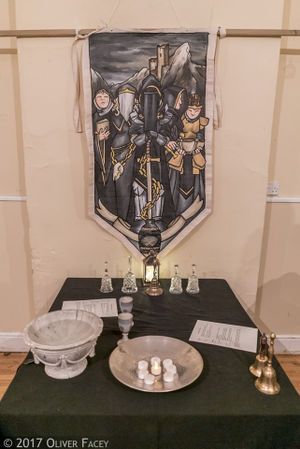Highguard hearth magic
| Line 12: | Line 12: | ||
This concealment can grant supernatural protection; creatures of the realms often find it hard to identify who they are speaking to when dealing with people who have cermonially concealed their features with a cowl or veil. | This concealment can grant supernatural protection; creatures of the realms often find it hard to identify who they are speaking to when dealing with people who have cermonially concealed their features with a cowl or veil. | ||
<!-- | |||
==Purification and Corruption== | ==Purification and Corruption== | ||
{{stub}} | {{stub}} | ||
In the same way that material things can become dirty, or worn, or tainted, so the soul can become corrupt. Purification removes taint and cleanses material goods and the soul alike. Tainted, corrupted things are less effective - a sword caked with mud and grime is not as sharp as a clean sword well maintained. Worse, corruption (like virtue) can be contagious. Soiled hands soil whatever they touch. Water and fire are both used to purify and clean - metal objects in particular can be purified with an open flame. | In the same way that material things can become dirty, or worn, or tainted, so the soul can become corrupt. Purification removes taint and cleanses material goods and the soul alike. Tainted, corrupted things are less effective - a sword caked with mud and grime is not as sharp as a clean sword well maintained. Worse, corruption (like virtue) can be contagious. Soiled hands soil whatever they touch. Water and fire are both used to purify and clean - metal objects in particular can be purified with an open flame. | ||
The Highborn traditions around [[Highguard_culture_and_customs#Washing_and_cleanliness|washing and cleanliness]] draw on this hearth magic. Someone who feels they have acted unvirtuously may symbolically wash themselves before beginning to make amends for their behaviour. There have been accusations that zealous Highborn have executed people they considered particularly unvirtuous with immolation or drowning, but there is no evidence of this. Indeed, many Highborn would find the idea of doing so abhorrent and showing a fundamental lack of understanding of the difference between the body and the spirit. | The Highborn traditions around [[Highguard_culture_and_customs#Washing_and_cleanliness|washing and cleanliness]] draw on this hearth magic. Someone who feels they have acted unvirtuously may symbolically wash themselves before beginning to make amends for their behaviour. There have been accusations that zealous Highborn have executed people they considered particularly unvirtuous with immolation or drowning, but there is no evidence of this. Indeed, many Highborn would find the idea of doing so abhorrent and showing a fundamental lack of understanding of the difference between the body and the spirit. --> | ||
[[Category:Highguard]] | [[Category:Highguard]] | ||
[[Category:Nations]] | [[Category:Nations]] | ||
Revision as of 16:04, 19 February 2018
Bells and chimes
The Highborn hang wind-chimes in their doorways to bring back memories of those they have lost, and the echoes of wisdom from earlier days. Meditating to the sound of wind chimes is said to help to attune one to thoughts of one’s ancestors and prior incarnations, and allow the dead to “speak” to the living through their memories. The household use of bells endures for similar reason, in the belief that the wind carries the breath and words of the departed. It is commonly held that bells can speak for those who have no breath or voice. The sound of bells ringing encourages the Highborn to remember the words of dead people who are important or inspirational to them.
More practically, bells and chimes exert influence over the unquiet dead. Restless spirits will not approach the sound of wind chimes, and the ringing of bells causes such creatures to flee in terror. As a consequence, most people who spend any time around the dead - especially the Stewards of the Dead and Magisters - will keep a bell on their person at all times.
Cowls and Veils
Properly prepared and worn head coverings conceal the identity of the wearer. Unlike the masks of the League, they do not present a false-face to the world; this is a hearth magic of obfuscation, not deception. The wearer maintains their sense of self, but they present a blank exterior to outsiders, an enigma. They step away from the world for a short time and become apart from it - a tradition that leads to many Highguard circles ceremonially donning cowls or veils when they must talk of matters of justice, or frankly discuss sensitive matters. The wearer of the cowl, or the veil, metaphorically ceases to be themselves for the duration of such a discussion.
When the Highborn don veils or draw up their cowls as a group, it means they are about serious business. For some, it means they have stopped being individual humans and for a short time embody primal forces of virtue.
This concealment can grant supernatural protection; creatures of the realms often find it hard to identify who they are speaking to when dealing with people who have cermonially concealed their features with a cowl or veil.

